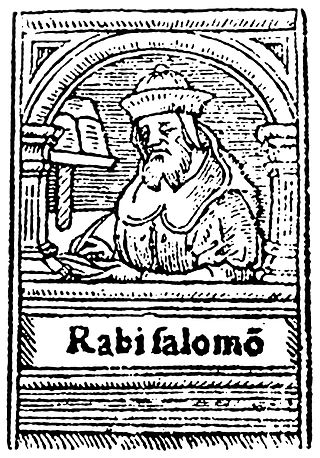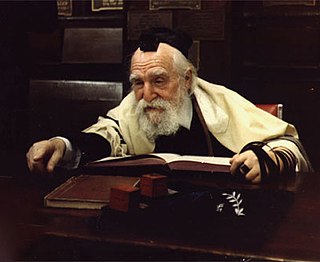Halakha, also transliterated as halacha, halakhah, and halocho, is the collective body of Jewish religious laws that are derived from the Written and Oral Torah. Halakha is based on biblical commandments (mitzvot), subsequent Talmudic and rabbinic laws, and the customs and traditions which were compiled in the many books such as the Shulchan Aruch. Halakha is often translated as "Jewish law", although a more literal translation of it might be "the way to behave" or "the way of walking". The word is derived from the root which means "to behave". Halakha not only guides religious practices and beliefs, it also guides numerous aspects of day-to-day life.

Shlomo Yitzchaki, commonly known by the acronym Rashi, was a French rabbi who authored comprehensive commentaries on the Talmud and Hebrew Bible.
A rabbi is a spiritual leader or religious teacher in Judaism. One becomes a rabbi by being ordained by another rabbi—known as semikha—following a course of study of Jewish history and texts such as the Talmud. The basic form of the rabbi developed in the Pharisaic and Talmudic eras, when learned teachers assembled to codify Judaism's written and oral laws. The title "rabbi" was first used in the first century CE. In more recent centuries, the duties of a rabbi became increasingly influenced by the duties of the Protestant Christian minister, hence the title "pulpit rabbis", and in 19th-century Germany and the United States rabbinic activities including sermons, pastoral counseling, and representing the community to the outside, all increased in importance.

Kitniyot is a Hebrew word meaning legumes. During the Passover holiday, however, the word kitniyot takes on a broader meaning to include grains and seeds such as rice, corn, sunflower seeds, and sesame seeds, in addition to legumes such as beans, peas, and lentils.
Responsa comprise a body of written decisions and rulings given by legal scholars in response to questions addressed to them. In the modern era, the term is used to describe decisions and rulings made by scholars in historic religious law.

Jewish ethics is the ethics of the Jewish religion or the Jewish people. A type of normative ethics, Jewish ethics may involve issues in Jewish law as well as non-legal issues, and may involve the convergence of Judaism and the Western philosophical tradition of ethics.
Semikhah is the traditional Jewish name for rabbinic ordination.

Conversion to Judaism is the process by which non-Jews adopt the Jewish religion and become members of the Jewish ethnoreligious community. It thus resembles both conversion to other religions and naturalization. The procedure and requirements for conversion depend on the sponsoring denomination. Furthermore, a conversion done in accordance with one Jewish denomination is not a guarantee of recognition by another denomination. Normally, though not always, the conversions performed by more stringent denominations are recognized by less stringent ones, but not the other way around. A formal conversion is also sometimes undertaken by individuals whose Jewish ancestry is questioned or uncertain, even if they were raised Jewish, but may not actually be considered Jews according to traditional Jewish law.
Geonim were the presidents of the two great Babylonian Talmudic Academies of Sura and Pumbedita, in the Abbasid Caliphate. They were generally accepted as the spiritual leaders of the Jewish community worldwide in the early medieval era, in contrast to the Resh Galuta (exilarch) who wielded secular authority over the Jews in Islamic lands.
"Who is a Jew?" is a basic question about Jewish identity and considerations of Jewish self-identification. The question pertains to ideas about Jewish personhood, which have cultural, ethnic, religious, political, genealogical, and personal dimensions. Orthodox Judaism and Conservative Judaism follow Jewish law (Halakha), deeming people to be Jewish if their mothers are Jewish or if they underwent a halakhic conversion. Reform Judaism and Reconstructionist Judaism accept both matrilineal and patrilineal descent as well as conversion. Karaite Judaism predominantly follows patrilineal descent as well as conversion.
Jewish leadership has evolved over time. Since the destruction of the Second Temple in Jerusalem in 70 CE, there has been no single body that has a leadership position over the entire Jewish diaspora. Various branches of Judaism, as well as Jewish religious or secular communities and political movements around the world elect or appoint their governing bodies, often subdivided by country or region.
Israel Isserlin was a Talmudist, and Halakhist, best known for his Terumat HaDeshen, which served as one source for HaMapah, the component of the Shulkhan Arukh by Moses Isserles. He is also known as Israel of Neustadt, Israel of Marpurk, and Maharai.

Shlomo ben Avraham ibn Aderet was a medieval rabbi, halakhist, and Talmudist. He is widely known as the Rashba, the Hebrew acronym of his title and name: Rabbi Shlomo ben Avraham.

Rabbinic authority in Judaism relates to the theological and communal authority attributed to rabbis and their pronouncements in matters of Jewish law. The extent of rabbinic authority differs by various Jewish groups and denominations throughout history.
The history of responsa in Judaism, spans a period of 1,700 years. Rabbinic responsa constitute a special class of rabbinic literature, differing in form, but not necessarily in content, from Rabbinic commentaries devoted to the exegesis of the Bible, the Mishnah, the Talmud, and halakha. The codes themselves contain the rules for ordinary incidents of life. The responsa literature covers all these topics and more.

Moshe Feinstein was a Russian-born American Orthodox Jewish rabbi, scholar, and posek. He has been called the most famous Orthodox Jewish legal authority of the twentieth century and his rulings are often referenced in contemporary rabbinic literature. Feinstein served as president of the Union of Orthodox Rabbis, Chairman of the Council of the Moetzes Gedolei HaTorah of the Agudath Israel of America, and head of Mesivtha Tifereth Jerusalem in New York.
Natronai Ben Hilai HaKohen was Gaon "head rabbi" of the Sura Academy of Rabbinic Judaism in Mesopotamia early in the second half of the 9th century. He held this post for ten years. He is responsible for more written responsa to queries posed to him by world Jewry than any of his predecessors, and maintained close contact with the Jews of al-Andalus.
Hashkafa is the Hebrew term for worldview and guiding philosophy, used almost exclusively within Orthodox Judaism. A hashkafa is a perspective that Orthodox Jews adopt that defines many aspects of their lives. Hashkafa thus plays a crucial role in how these interact with the world around them, and influences individual beliefs about secularity, gender roles, and modernity. In that it guides many practical decisions—where to send children to school, what synagogue to attend, and what community to live in—hashkafa works in conjunction with halakha or Jewish law.

Yehoshua Mondshine was an Israeli rabbi, scholar, researcher and historian associated with the Chabad-Lubavitch, Hasidic movement. Mondshine worked as a librarian and bibliographer at the National Library of Israel in Jerusalem.
Responsa of the Geonim are responsa written by rabbis of the Geonic period in response to questions addressed to them.







